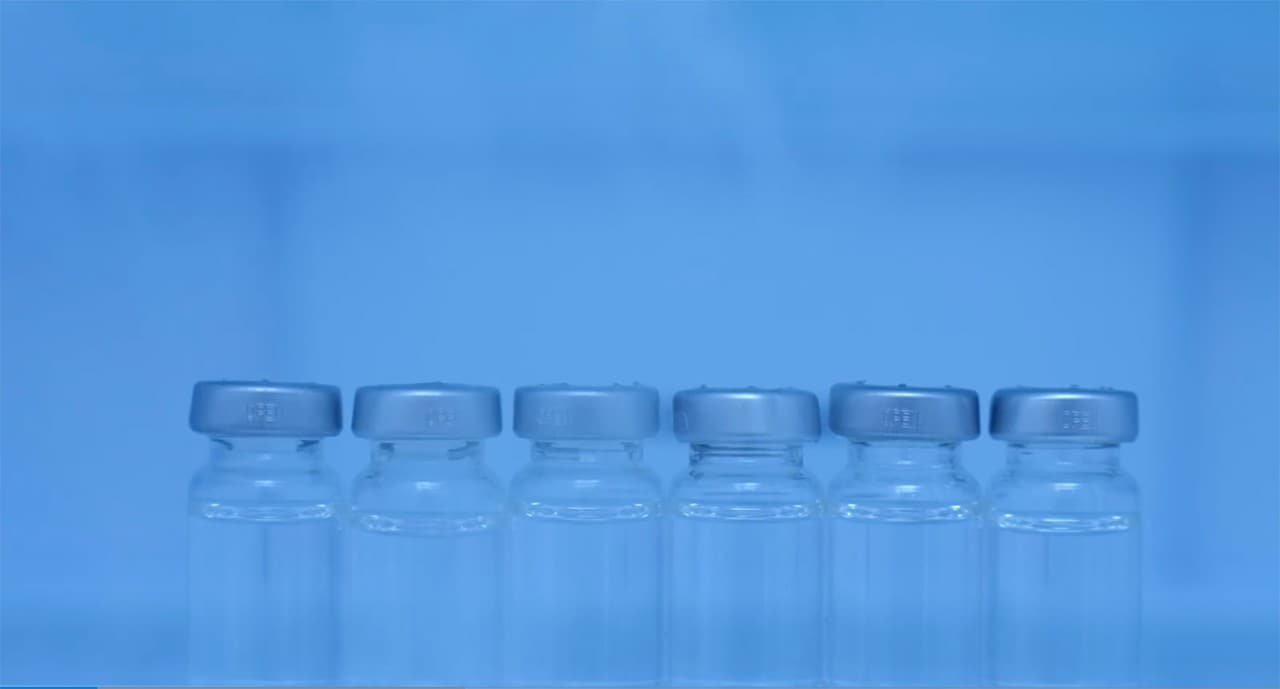- Viðskiptavinir
- North Carolina Collaboratory
The North Carolina Collaboratory achieved this using • SAS® for Cold Chain Integrity powered by SAS® Analytics for IoT on Microsoft Azure
The North Carolina Collaboratory relies on SAS® Analytics for IoT on Microsoft Azure to harness the complex system of cold chain logistics, ensuring safe transport, storage and availability of COVID-19 vaccines statewide
The rapid creation of COVID-19 vaccines is a scientific marvel that has saved countless lives. For the North Carolina Collaboratory, vaccine rollout is where its latest story begins.
Established by the North Carolina General Assembly in 2016, the Collaboratory is a research and policy organization that is able to tap into the resources and expertise of all 17 institutions of the University of North Carolina System.
Vaccines are delicate substances that can spoil if they get too hot. In fact, failures in temperature-controlled logistics result in $35 billion in annual biopharma losses, according to the IQVIA Institute for Human Data Science.
When COVID-19 vaccines first rolled out in late 2020, they came with stringent temperature requirements. The Pfizer vaccine, for example, had to be shipped between -80°C and -60°C, could only be kept in a normal freezer at -20°C for two weeks, and unopened vials could only be stored at refrigerated temperatures between 2°C and 8°C for five days.
For a geographically diverse state like North Carolina – with rural mountain towns, dense urban cities and remote coastal outposts – this presented a logistical challenge. The state needed a reliable way to transport and store vaccines at extremely low temperatures.
Dr. Jeff Warren, Executive Director for the Collaboratory, was acutely aware of this challenge. His team received $29 million from the North Carolina General Assembly to develop and oversee a pan-campus COVID-19 research portfolio that comprised more than 90 projects across 15 UNC System campuses, including six Historically Minority-Serving Institutions (HMSIs). “Operation Deep Freeze” was one of those projects.
“COVID-19 created the largest and most complex medical logistics program in modern history,” Warren says. “One of the most formidable challenges has been to protect supply chain integrity as vaccines are transported and stored from manufacturers to administration sites – particularly those in hard-to-reach, underserved communities. With the announcement of the vaccine rollout, it dawned on me that our campuses could be a wonderful resource for the state to help with cold chain storage. But it begged the question: Does our state have enough cold chain storage to handle these vaccines?”
Thus began a project aimed at the safe and swift distribution of COVID-19 vaccines to the people of North Carolina, with an emphasis on underserved communities.
SAS shows us how the health of a freezer affects the health of the vaccine. The cold chain integrity solution has been instrumental in providing the insight we need to ensure our freezers are performing as intended.Dr. Jeff Warren Executive Director North Carolina Collaboratory
Cold chain integrity
The Collaboratory purchased 63 -90°C freezers from Stirling Ultracold. With its 32 large freezers, two midsize freezers and 29 smaller mobile units, the state gained the capacity to hold 1.86 million 2mL vials of the vaccine. With about five doses in each vial, that amounts to 9.3 million doses – almost enough for every person in the state at any given time.
The answer to how to safely transport and store vaccines lies in a low temperature-controlled supply chain called a cold chain: an uninterrupted series of refrigerated production, storage and distribution activities, along with associated equipment and logistics.
Here’s where things get challenging. Given the urgency of the vaccine, waste is unacceptable. Acquiring the freezers was the first step. But how could the Collaboratory continuously and remotely monitor both the freezers and vaccines to ensure an unbroken cold chain and successful administration of the vaccine?
The Collaboratory turned to SAS for Cold Chain Integrity, a solution powered by SAS Analytics for IoT designed to help organizations harness the complex system of cold chain logistics for biologics, including high-value pharmaceuticals, gene therapy products and vaccines.
As a proof of concept, SAS was brought on for its industry-leading streaming analytics capabilities to analyze data from 10 vaccine-storing freezers, each outfitted with IoT sensors. The project monitored the impact of factors including temperature, humidity, vibration during transport, opening and closing, duration in storage and freezer capacity, while tapping predictive insights and intelligent alerting capabilities to identify and address potential dosage loss and regional vaccine shortages.
“SAS shows us how the health of a freezer affects the health of the vaccine,” Warren says. “The cold chain integrity solution has been instrumental in providing the insight we need to ensure our freezers are performing as intended.”
A public-private partnership
Just as the scientific world came together to develop a COVID-19 vaccine at record speed, the vaccine rollout in North Carolina has been a collaborative effort involving multiple public and private institutions.
“Stirling Ultracold moved us to the top of the line when they learned about the project,” Warren says. “Instead of waiting for the full order to be fulfilled, they sent us five or six freezers at a time because they knew we’d deploy them immediately.”
The SAS IoT ecosystem, which includes several key partners involved in this solution, enabled the Collaboratory to quickly and effectively deploy an enterprise-grade IoT analytics and artificial intelligence solution. One of those partners, Stress Engineering, brings cold chain expertise to the solution in the form of hardware, instrumentation and engineering design. In short, Stress Engineering makes sure each freezer contains the right data-collecting devices.
The solution is built on Microsoft Azure and uses SAS streaming analytics capabilities to securely transmit the IoT data via the cloud. With Microsoft Azure as part of the SAS solution, real-time data now streams from freezers across the state into a centralized dashboard for administrators to monitor vaccine integrity.
“We’re all learning from each other,” Warren says. “The greatest partnerships are often between academia and the real world when companies apply academic research to create products that benefit society. We’re seeing a shining example of that here.”
North Carolina Collaboratory – Facts & Figures
800+
research team members
$29 million
in funding for COVID-19 research projects
90
COVID-19 projects across 15 campuses
A focus on underserved communities
North Carolina stands out for its successful distribution of vaccines to underserved communities. This is highlighted in a 2021 Centers for Disease Control and Prevention report, which states how broad distribution of vaccines to Black and Hispanic North Carolinians has helped close the vaccination gap for these populations.
For Warren and his team, this validates their decision to prioritize underserved communities when it came to freezer distribution. Since the beginning, they emphasized the importance of getting vaccines to populations disproportionately affected by COVID-19.
The Collaboratory recognized that a lack of storage could create inequity for vaccine distribution in rural and low-resource communities. By providing freezers to these communities, the Collaboratory could ship COVID-19 vaccines to areas that otherwise couldn’t receive them.
“Campuses with high populations of underserved communities received a greater allocation of cold storage systems, and they got them before anywhere else,” Warren says. “The freezers allowed many of our campuses to offer vaccine clinics, not just for students, staff and faculty, but for the greater communities they serve. It demonstrates the big public service component of our campuses.”
Beyond the pandemic
The Collaboratory is in the pilot phase of looking at what data to collect and analyze to further improve vaccine integrity. Questions abound. How long can power go out with a freezer before vaccines spoil? How does room temperature affect freezer temperature? For mobile units using DC adapters for power, can drivers stop for lunch? Or should they eat in the vehicle to ensure the safe arrival of the vaccines to the destination?
For Warren, answering these questions and more through cold chain analytics can help North Carolina long after the pandemic ends.
“We have laboratories all over the system doing academic research and freezers all over the state handling biological samples,” he says. “We’re now stepping back to look at how cold chain integrity can help our researchers and teams beyond the vaccines.”
SAS will continue to play a vital role in this endeavor. “We need to push the limits of these devices to see what’s possible,” Warren concludes. “I can’t think of a better partner than SAS to bring that level of curiosity and innovation to the project.”




